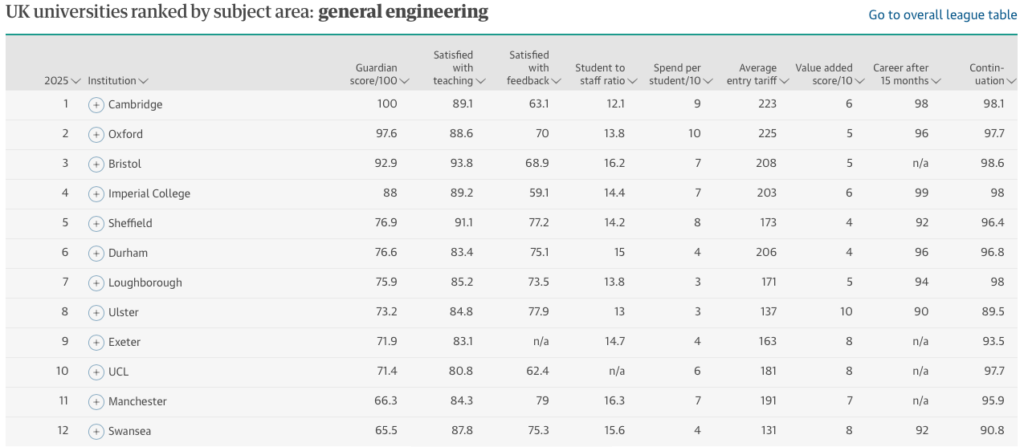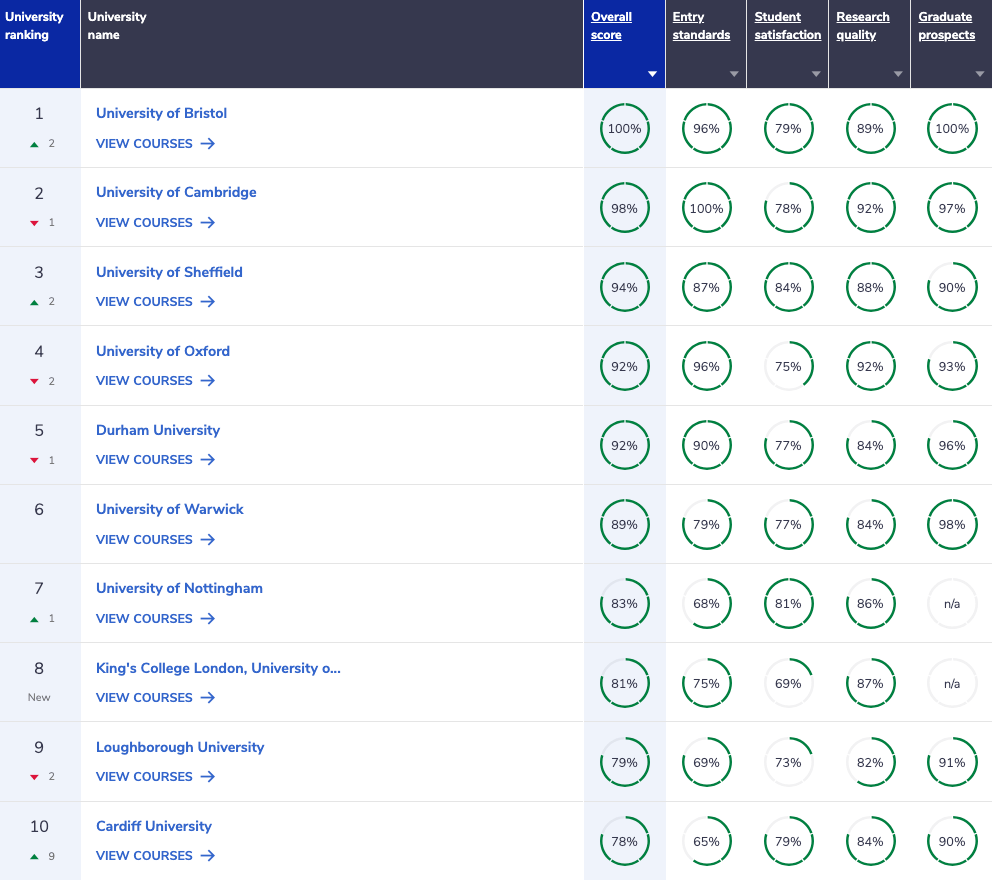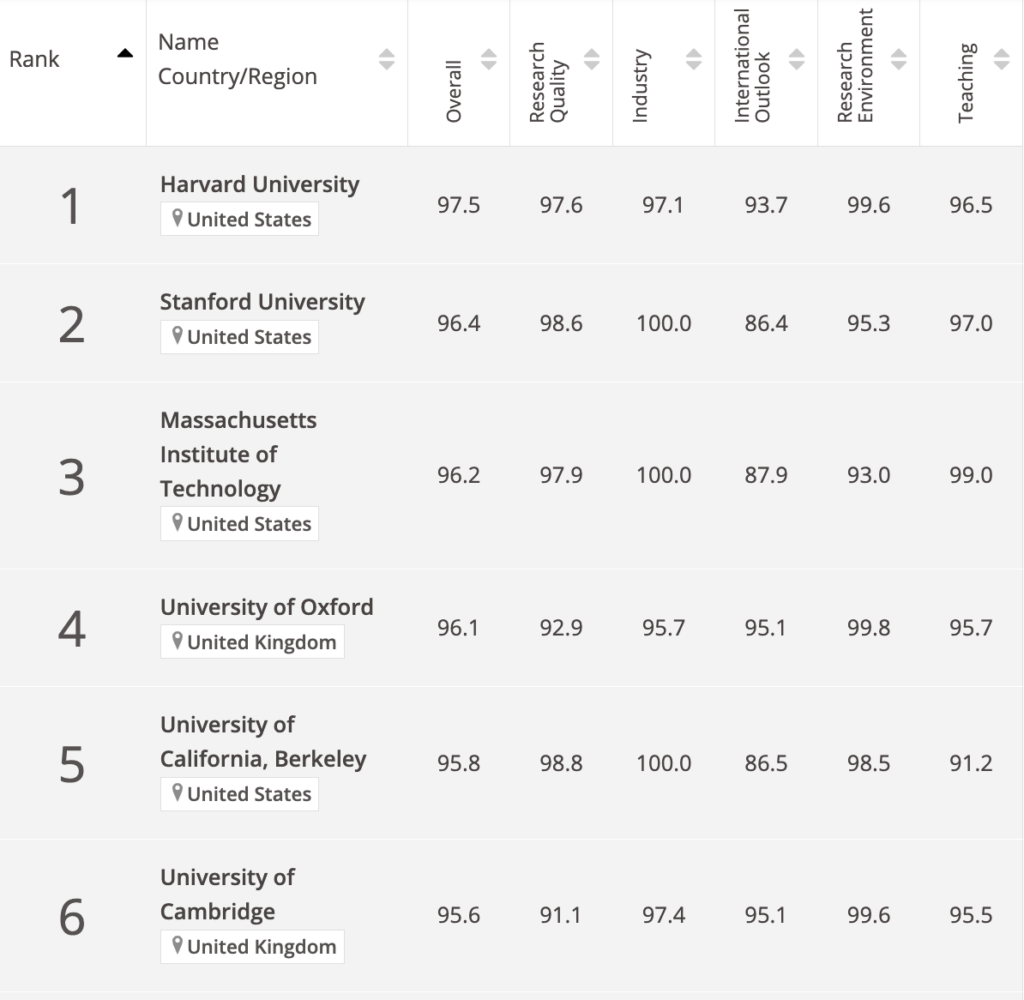The UK Engineering rankings are a popular and effective way to compare Engineering courses in the UK.
Prospective students gain valuable insight into the course, the university, and also student satisfaction and employability. The rankings vary according to your source, so knowing what to look out for is essential.
In this guide, we’ll explore who makes the rankings, why they’re useful, and how they should be used during your application. We’ll also review the ranking tables for General Engineering and several popular specialisations. With that in mind, let’s start!
Want to skip to the ranking tables? Press the button’s below:
Who Makes The UK Engineering Rankings?
There are a number of different ranking guides which compile their lists using different measuring factors. The Guardian and The Complete University Guide are just two of the most popular organisations that compile lists of the best universities for a number of different courses.
The factors that are assessed by The Guardian are:
Guardian score/100 – rating of excellence based on a combination of the other factors
Satisfied with the course – the rating of the overall quality of the course, given by final-year students in the latest National Students Survey (NSS) given as a percentage
Satisfied with the teaching – the rating of the quality of teaching on the course given by final-year students in the latest NSS
Satisfied with feedback – the rating of the feedback and assessment, given by final-year students in the latest NSS
Student to staff ratio – number of students per member of teaching staff
Spend per student/10 – money spent on each student, excluding academic staff costs, given as a rating out of ten
Average entry tariff – typical UCAS scores of young entrants to the department
Value added score/10 – this score compares students’ degree results with their entry qualifications, to show how effectively they are taught – given as a score out of ten
Career after 15 months – percentage of graduates who find graduate-level jobs, or are in further study at professional or higher education level, within 15 months of graduation
Continuation – percentage of first-year students continuing to second-year
Meanwhile, the factors that are assessed by The Complete University Guide are:
Overall score – the total score calculated by The Complete University Guide’s independent and trusted methodology
Entry standards – the average UCAS tariff of new students entering university
Student satisfaction – a guide to how satisfied students are with the quality of teaching they receive
Research quality – a measure of the quality of the research undertaken by the university
Research intensity – a measure of the proportion of staff involved in high-quality research at the university
Graduate prospects – outcomes – a guide to the success of graduates after leaving university
Graduate prospects – on track – a measure of whether recent graduates agree that their current activity fits with their future plans
Some of the data for these measures is taken from the National Student Survey (NSS), which is run annually and can be taken by all university students. This data includes student satisfaction rates and research quality. Other data points, such as employment and entry standards are collected directly from the universities.
Of course, they are not the only tables around for UK Engineering rankings. These are just the most widely used tables, but you may find you don’t agree with how some of the data is interpreted or don’t care about some of the measures used. We’d encourage you to explore the different options, as well as doing in-depth research into the universities yourself.
Early preparation is the key to securing your place at Oxbridge.
Our expert tutors are on hand to help you craft the perfect Personal Statement, achieve a highly competitive Admissions Test score, be that the ESAT or the PAT, and teach you how to Interview effectively.
Discover our Full-Blue Engineering Programme by clicking the button below to enrol and triple your chances of success.
The Guardian Engineering University Rankings 2026
Below is The Guardian’s league table in full, displaying the results for 2025 and a comparison to 2024’s results. This table is specifically for General Engineering, which is a less common degree in the UK than specific engineering courses, which we will explore later.
| Postition | University | Previous Position (2024) |
|---|---|---|
| 1 | University of Cambridge | 1 (=) |
| 2 | University of Oxford | 2 (=) |
| 3 | University of Bristol | 9 (>6) |
| 4 | Imperial College London | 3 (<1) |
| 5 | University of Sheffield | 8 (>3) |
| 6 | Durham University | 5 (<1) |
| 7 | Loughborough University | 10 (>3) |
| 8 | Ulster University | 14 (>6) |
| 9 | University of Exeter | 6 (<3) |
| 10 | University College London (UCL) | 6 (<4) |
| 11 | University of Manchester | 11 (=) |
| 12 | Swansea University | 15 (>3) |
| 13 | Aston University | 13 (=) |
| 14 | University of Birmingham | 16 (>2) |
| 15 | Cardiff University | 18 (>3) |
| 16 | Nottingham Trent University | 4 (<12) |
| 17 | University of Central Lancashire | 20 (>3) |
| 18 | University of Leeds | 17 (<1) |
| 19 | University of Warwick | 21 (>2) |
| 20 | Queen Mary University of London | 19 (<1) |
| 21 | University of East Anglia | 22 (>1) |
| 22 | Glasgow Caledonian University | 25 (>1) |
| 23 | University of Strathclyde | 23 (<2) |
The University of Cambridge once again takes the top spot in this year’s ranking, while Oxford remains in second, placing the two Oxbridge universities next to one another.
The University of Strathclyde takes the bottom spot this time around, with Glasgow Caledonian overtaking it after being last in the previous year. There were also two universities that have been removed from the ranking after appearing in 2024’s ranking. These are King’s College London and the University of Leicester.
The biggest change in ranking comes from Nottingham Trent, which dropped 12 places from 4th to 16th. There weren’t too many significant changes other than this, although Bristol and Ulster each rose six places in the rankings.
Complete University Guide Engineering University Ranking Table 2026
Below is the full Complete University Guide ranking table, displaying the results for 2026 and a comparison to 2025’s results:
| Postition | University | Previous Position (2025) |
|---|---|---|
| 1 | University of Bristol | 3 (>2) |
| 2 | University of Cambridge | 1 (<1) |
| 3 | University of Sheffield | 5 (>2) |
| 4 | University of Oxford | 2 (<2) |
| 5 | Durham University | 4 (<1) |
| 6 | University of Warwick | 6 (=) |
| 7 | University of Nottingham | (>1) |
| 8 | King’s College London | NEW |
| 9 | Loughborough University | 7 (<2) |
| 10 | Cardiff University | 19 (>9) |
| 11 | Queen Mary University of London | 12 (>1) |
| 12 | Aston University | 15 (>3) |
| 13 | University of Exeter | 10 (<3) |
| 14 | University of Aberdeen | 11 (<3) |
| 15 | Ulster University | 14 (<1) |
| 16 | University of Strathclyde | 16 (=) |
| 17 | University of Leicester | 18 (>1) |
| 18 | Liverpool John Moores University | 20 (>2) |
| 19 | Brunel University | 17 (<2) |
| 20 | Swansea University | NEW |
| 21 | Lancaster University | NEW |
| 22 | Nottingham Trent University | 13 (<9) |
| 23 | London South Bank University | 22 (<1) |
| 24 | Glasgow Caledonian University | 21 (<3) |
| 25 | University of York | NEW |
| 26 | Coventry University | 27 (>1) |
| 27 | University of East Anglia | 26 (<1) |
| 28 | Bournemouth University | 24 (<4) |
| 29 | University of Essex | 25 (<4) |
| 30 | Canterbury Christ Church University | NEW |
| 31 | New Model Institute for Technology and Engineering (NMITE) | NEW |
| 32 | University of West Scotland | 23 (<9) |
| 33 | University of Portsmouth | NEW |
| 34 | University of Northampton | 28 (<6) |
This year, a total of 6 new universities were added to the ranking table for General Engineering. Unlike The Guardian’s ranking, Cambridge and Oxford didn’t the first and second spots this year. Instead, the University of Bristol (which ranked 3rd last year) took the top spot, followed by Cambridge. As well as this, Oxford was moved down to fourth, being overtaken by the University of Sheffield.
The University of Northampton ranks last again this year, though one university was removed from the ranking – the University of Liverpool. The new entries on the list are scattered across the table, with King’s College London being the highest ranked at 8th.
It’s worth noting that the list of universities ranked on each list is fairly different, with each one featuring some unique entries. This is likely due to differing beliefs on what counts as a “general” engineering course, so looking at both would be your best option to see the full breadth of options.
As for position changes, the biggest increase was for the Cardiff University (19th to 10th), while the biggest drop was shared between Nottingham Trent and West Scotland (down 9 places each).
Access "The Big Book Of Oxbridge Applications" For FREE
Are you considering applying to Oxford or Cambridge? The Big Book of Oxbridge Applications is your must-have resource. Whether you’re exploring colleges, preparing for admissions tests, mastering your UCAS application, crafting a standout Personal Statement, or aiming for exam success, this free book will be invaluable to your preparation. You’ll find:
- Over 40 admissions test practice questions
- 28 example Oxbridge Personal Statements
- Interviews with Oxbridge students and graduates
- Additional downloadable resources

Access "The Oxbridge Application Vault"
- 300+ page ebook for Oxbridge Applicants
- 25 page ebook for Personal Statement
- 2h+ online course to succeed in any exam
- Online Oxbridge Success Calculator
- 12 page ebook about UniAdmissions

The Best and Worst UK Universities For Engineering
Before we look at this topic, let’s preface this by saying that these universities are only the “best” and “worst” in the context of these ranking tables. Each university in the UK has unique strengths and weaknesses, so the quality of each is subjective. If one of the lower universities appeals to you, you shouldn’t stop yourself from applying just because of these rankings.
With that being said, let’s take a look at the top five and bottom five entries of each table:
Best Universities For Engineering UK
The top-ranking universities in any given subject don’t tend to shift too much from year to year. However, these two ranking tables often have differing opinions on which university is the best.
Let’s look at the top five UK engineering universities for each list:
Complete University Guide
- University of Bristol
- University of Cambridge
- University of Sheffield
- University of Oxford
- Durham University
The Guardian
- University of Cambridge
- University of Oxford
- University of Bristol
- Imperial College London
- University of Sheffield
These two lists are fairly consistent, though the four common universities all have different placements on each list.
Imperial College London, often considered one of the top universities in the world, does not appear on Complete University Guide’s ranking, so Durham University takes its place in the top five instead. Durham narrowly missed the top five on The Guardian’s table, too, ranking 6th.

Worst Universities For Engineering UK
Calling these the “worst” universities for Engineering is very harsh language, but it’s a fact that some universities must populate the bottom of the list. These placements do not make these bad universities to study at, but the data has shown that these institutes may not be as strong as others in certain areas.
Here are the lowest-ranked Engineering universities in the UK in ascending order:
Complete University Guide
- University of Northampton
- University of Portsmouth
- University of West Scotland
- New Model Institute for Technology and Engineering (NMITE)
- Canterbury Christ Church University
The Guardian
- University of Strathclyde
- Glasgow Caledonian University
- University of East Anglia
- Queen Mary University of London
- University of Warwick
As we can see, there is no parity between the two lists here, potentially because Complete University Guide’s list is primarily made up of new entries. While the University of Northampton doesn’t feature on The Guardian’s list, Strathclyde ranked 16th on The Complete Uni Guide’s list.
One important detail is the inclusion of two Russell Group universities in The Guardian’s bottom five – Queen Mary and Warwick. This is highly unusual, seeing as the group generally performs very well in rankings, particularly Warwick. On the Complete Uni Guide table, Warwick ranked 6th and Queen Mary ranked 11th, indicating that these aren’t objectively weaker universities for the subject.
When looking at the Complete Uni Guide, you should also be aware that some universities are ranked with incomplete data. Due to how the rankings are ordered, this missing data negatively impacts their rankings. This makes these placements even more unreliable, though the data that is available still produced scores on the lower end of the spectrum.
Specialist Engineering Course Rankings
When it comes to engineering, it’s important to remember that it’s not just general engineering. While most general engineering degrees will let students specialise during their course, you also have the option to jump straight into your chosen discipline by applying for specialist engineering degrees.
These degrees have their own ranking tables, so let’s take a look at the top ten universities for some of the most popular degrees in engineering:
Aerospace Engineering University Ranking UK
| Placement | University |
|---|---|
| 1 | Imperial College London |
| 2 | University of Southampton |
| 3 | University of Bristol |
| 4 | University of Bath |
| 5 | University of Sheffield |
| 6 | University of Nottingham |
| 7 | University of Birmingham |
| 8 | University of Liverpool |
| 9 | University of Glasgow |
| University of Manchester |
| Placement | University |
|---|---|
| 1 | Imperial College London |
| 2 | University of Bristol |
| 3 | University of Sheffield |
| 4 | University of Bath |
| 5 | University of Coventry |
| 6 | University of Birmingham |
| City, University of London | |
| 8 | University of Southampton |
| 9 | Loughborough University |
| 10 | University of South Wales |
Chemical Engineering University Ranking UK
| Placement | University |
|---|---|
| 1 | University of Cambridge |
| 2 | University of Oxford |
| 3 | Imperial College London |
| 4 | University of Bath |
| 5 | University College London |
| 6 | University of Birmingham |
| 7 | University of Leeds |
| 8 | University of Edinburgh |
| 9 | University of Nottingham |
| 10 | University of Strathclyde |
| Placement | University |
|---|---|
| 1 | University of Cambridge |
| 2 | University of Bath |
| 3 | Aston University |
| 4 | University of Nottingham |
| 5 | Imperial College London |
| 6 | University of Hull |
| 7 | University of Leeds |
| 8 | University of Edinburgh |
| 9 | Loughborough University |
| 10 | University of Hundersfield |
Civil Engineering University Ranking UK
| Placement | University |
|---|---|
| 1 | University of Cambridge |
| 2 | University of Oxford |
| 3 | Imperial College London |
| 4 | University of Bath |
| 5 | University of Sheffield |
| 6 | University of Southampton |
| 7 | University of Birmingham |
| 8 | University of Bristol |
| 9 | Queen’s University Belfast |
| 10 | University of Liverpool |
| Placement | University |
|---|---|
| 1 | University of Bristol |
| 2 | Imperial College London |
| 3 | University of Strathclyde |
| 4 | University of Southampton |
| 5 | University of Sheffield |
| 6 | University of Manchester |
| 7 | University of Bath |
| 8 | University of Edinburgh |
| 9 | University of Leeds |
| 10 | University of Liverpool |
Electrical Engineering University Ranking UK
| Placement | University |
|---|---|
| 1 | University of Cambridge |
| 2 | Imperial College London |
| 3 | University of Oxford |
| 4 | University of Southampton |
| 5 | University of Glasgow |
| 6 | University College London |
| 7 | University of Leeds |
| 8 | University of Sheffield |
| 9 | University of Bristol |
| 10 | University of Bath |
| Placement | University |
|---|---|
| 1 | University of Leeds |
| 2 | University of Strathclyde |
| 3 | University College London (UCL) |
| 4 | Cardiff University |
| 5 | Manchester Metropolitan University |
| 6 (=) | University of Sheffield |
| 6 (=) | University of Southampton |
| 8 | Imperial College London |
| 9 | Queen’s University, Belfast |
| 10 | University of Nottingham |
Mechanical Engineering University Ranking UK
| Placement | University |
|---|---|
| 1 | Imperial College London |
| 2 | University of Cambridge |
| 3 | University of Oxford |
| 4 | University of Bristol |
| 5 | University of Bath |
| 6 | University of Sheffield |
| 7 | University of Leeds |
| 8 | University of Southampton |
| 9 | University of Birmingham |
| 10 | Loughborough University |
| Placement | University |
|---|---|
| 1 | Imperial College London |
| 2 | University of Bath |
| 3 | Trinity Saint David University |
| 4 | University of Sheffield |
| 5 | Loughborough University |
| 6 | University of Edinburgh |
| 7 | Swansea University |
| 8 | University of East London |
| 9 | University of Exeter |
| 10 | University of Lancaster |
As you can see, there are a few dominant universities across most fields of engineering, including Imperial College London, Bath, Bristol and Leeds.
It’s worth noting that the two tables seem to disagree on whether Oxford and Cambridge are eligible for these lists. Both universities only offer general courses but allow for specialisation within the later years of the course and have dedicated departments for different forms of engineering. The Guardian doesn’t include them (excluding chemical engineering, as Cambridge does offer a standalone course for this), while Complete Uni Guide does feature them.
Either way, it’s definitely useful to look at these tables if you’re considering a specialist degree or if you want to know which universities excel in the specialisation you’re interested in.
UK vs International Engineering Rankings
The 2022 Engineering rankings from Times Higher Education (THE) features 1,188 universities across more than 70 countries. Although the schools at the very top are in the US and the UK, universities in Singapore, China and Switzerland perform extremely well.
China is the second most-represented country in the list of the best universities for Engineering, ahead of the UK, Germany, Australia and Canada.
THE use the following metrics and weightings to create their ranking tables:
- Teaching (29.5%) This relates to the learning environment, based on reputation, income and ratios.
- Research Environment (29%) This is based on Research reputation, income and productivity.
- Research Quality (30%) This is based on research strength, excellence and influence, as well as citation impact.
- International Outlook (7.5%) This is based on the proportions of international students and staff, as well as international collaboration.
- Industry (4%) This is based on industry income and patents.
International rankings are useful for those considering applying abroad, as well as international applicants looking to study in the UK. However, most applicants won’t need to worry about these rankings as they most likely won’t be willing to move to a different country to study.
Which Ranking Table Should I Follow?
Which table you follow depends on what is most important to you. For example, you may place more importance on ‘spend per student’ or career prospects. The Guardian has created its own way of ranking universities, which is primarily based on student perspectives. The Complete University Guide, on the other hand, focuses on student satisfaction.
It can be easy to get carried away with all of these different ratings and rankings of the best Engineering courses in the UK. However, it is crucial to remember that no matter which university you attend, you will graduate with the future of a fully respected career which is boundless in its opportunities.
It may seem obvious, but with the masses of data and information these tables assess, it is essential to know what you are wanting to get out of your time at university. Though the tables are presented with the “best” at the top, that may not be what you are looking for with your degree. Only you know what is important to you and what considerations you have in mind when looking at league rankings.
Some things you should consider include:
- Do you want a high staff to student ratio?
- Do you want to go somewhere with a high average entry tariff?
- Do you want a course with a more even split between male and female students?
All the league tables that we have looked at The Guardian, The Complete University Guide and The Times Higher Education World Rankings allows you to re-order the tables according to the criteria that are important to you, such as student ratio, student satisfaction, and graduate prospects. This allows you to determine what university is best suited to you based on your desires.
What you must keep in mind is that these league tables should only be considered as a starting point, from which you ought to carry out further research.
Entry to these top-rated universities is highly competitive and this is something which should also be carefully considered when assessing these tables. Oxford has a 16% success rate for its Engineering Science course, and Cambridge’s acceptance rate is similar at around 13%. Make sure you are aware of entry requirements to ensure you can successfully achieve them.
What is most important to remember is that these rankings should only be taken into consideration. Do not make a decision based upon them but instead use it as a stepping stone to do further research and determine what universities meet your personal requirements.
The rankings establish the best-performing universities but ultimately, what is ideal for other applicants will differ from what is ideal for you, so consider the rankings but form your own opinions.
That concludes our look at engineering university rankings in the UK. Remember to do your own research after you’ve gone through the rankings to see which of these universities appeal to you. One of the best ways to learn about a university is to attend an open day on campus. At these events, you’ll be able to explore the area, view the facilities and speak with staff and students about the course and student experience.
However you choose to conduct your research, we wish you the very best of luck with your application. If you’re applying to Oxford or Cambridge you need extra support in any part of your application, including the admissions test and interview, discover how our Engineering Full-Blue Programme can triple your chances of gaining your offer!
Our expert tutors will guide you to Oxbridge Engineering success.
Applying to Oxbridge is immensely competitive, and you must give yourself the best chance of success. We help you craft the perfect Personal Statement, achieve a highly competitive ESAT or PAT score and teach you how to Interview effectively – covering all areas of your Oxbridge application.
Discover our Full-Blue Engineering Programme for comprehensive admissions support by clicking the button below to enrol and triple your chances of success.









